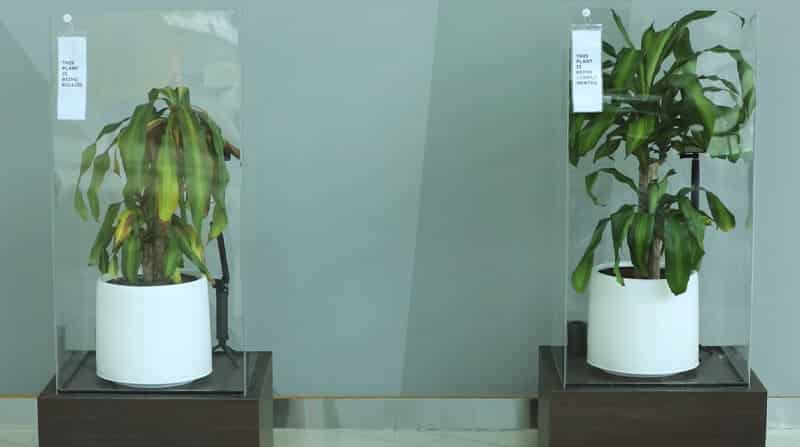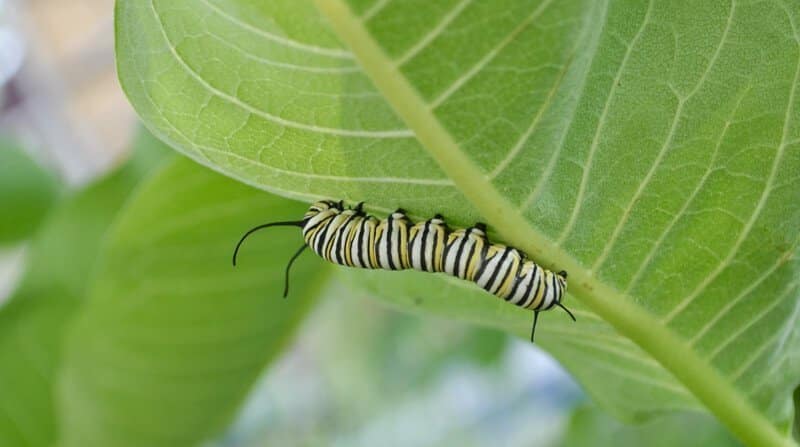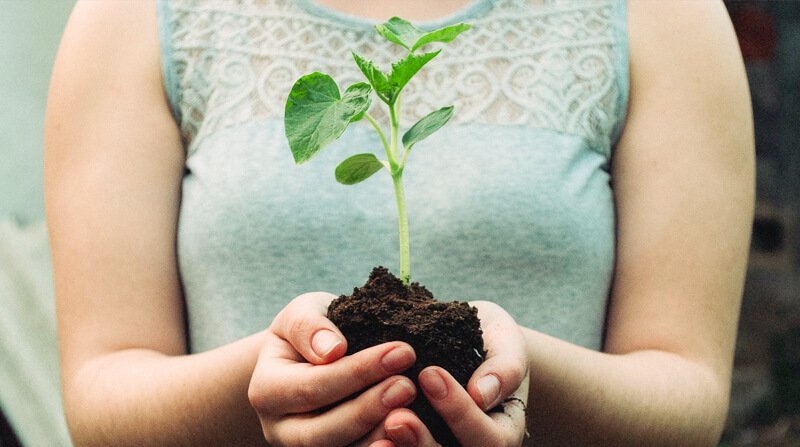Are plants more than just vegetables? Do plants have feelings?
Well, the Swedish furniture company, IKEA recently conducted an experiment as part of their anti-bullying campaign…
#SayNoToBullying
A very worthy cause!
In this experiment, they took two identical potted plants and placed them in a school.
Both plants received the same amount of light, water and fertiliser for 30 days.
Students were then instructed to be nice and compliment one plant, saying things like, ‘You make me happy’. They were then told to bully and insult the other plant and say things like, ‘You don’t look real’.
The words that were spoken to the plants was the only difference. Everything else was the same.
What happened?
Here’s a video of IKEA’s experiment:
The Results
After 30 days, the plant that received all of the compliments looked healthy.
However, the plant that was bullied started to droop, looked very unhealthy and pretty sorry for itself.

Does This Prove that Plants Have Feelings?
In a word, no.
At least not from an emotional standpoint.
This experiment is reminiscent of a claim made in the 1973 book, The Secret Life of Plants.
Authors Peter Tompkins and Christopher Bird conducted a series of experiments to see if plants could feel pain, if they could communicate and to see if they had senses like human beings.
One of the most enduring claims made by the book was that plants responded positively when classical music was played to them.
Science has come a long way since the 1970’s and so has the study into plant senses.
They clearly interact with the world. They sense and react to light and heat and they’re affected positively or negatively, depending on how much food and water they consume, just as we are.
So the question (or questions, rather) is do plants have feelings? Do they feel emotion, pain, can they see, hear and smell? Do they communicate with each other?
What Senses Do Plants Have?
Plants behave in all kinds of ways and react differently to different types of stimuli.
Anyone who has witnessed a fly snapped up by a Venus Flytrap or sensitive plant wilt at just a touch has surely wondered…
Do plants have feelings or at least senses?
Let’s take a look.
Do Plants Feel Emotion?
This is one of those claims made in the 1973 book, ‘The Secret Life of Plants’.
The authors claimed that plants do feel emotions and have intuitive capabilities. While the book is a fascinating read, many of its claims, including the theory that plants feel emotions, are unsubstantiated.
The fact is that while plants are sentient life forms, they don’t have brains and so don’t have reasoning capabilities. This means they can’t feel emotions like happiness or sadness.
So what about IKEA’s experiment above?
It was an experiment to raise awareness about bullying, not necessarily an experiment into plant science. As a result, I’d take that result with a pinch of salt.
Do Plants Feel Pain?
This is a constant argument between vegans and meat-eaters.
Meat eaters claim that because plants are living beings, they feel pain just like the cows, lamb and pigs they eat.
So let’s kill this myth once and for all.
Do plants feel pain?
No, they don’t.
Again, plants don’t have brains. They also don’t have a peripheral nervous system like humans and animals.
A peripheral nervous system contains nerve cells that form a network that carries messages from the skin, muscles, organs etc. to the brain. The brain responds by sending messages back to the site of pain to start the process of healing.
With the lack of a brain or nervous system, the plant simply cannot feel pain.
This video from MercyForAnimals.org explains the science better than I can;
Can Plants Feel Touch?
Just like in other senses, plants don’t ‘feel’ in the way that we feel things.
But plants do know when they’re being touched, if you pinch a flower, or saw a branch off.
They can also differentiate between hot and cold.
You only need to watch the Venus Flytrap in action to understand that plants know when they’re in direct contact with something.
When a fly or unfortunate insect lands on a Venus Flytrap and bends the hairs on the inside of the leaf, they snap shut, trapping the insect, which is then digested by the plant.
What’s even more curious is that a Venus Flytrap can tell the difference between an insect and a drop of rain. It won’t snap closed when a drop of water hits it.
The same can be said for vines and plants like Ivy. You can almost see their increase in growth activity as soon as they come into contact with a fence or a tree they can wrap around.
Can Plants See?
Obviously, plants don’t have eyes so they don’t ‘see’ in the traditional sense. But they constantly monitor their visible environment.
Us humans have photoreceptors in our eyes called rods and cones and we see things as pictures. However, we only have two.
Plants, on the other hand, have at least 11 different photoreceptors that react to sunlight.
They know when it’s light, when it’s dark and when there is more or less light during the days.
Being able to understand the length of day time hours versus night time hours is called ‘photoperiodism’. This is how they understand the difference between the seasons.
During the spring and summer when the days are longer, hormones such as Florigen react to light causing plants to flower.
New research has even suggested that plants can differentiate between different colours.
It’s claimed they can see and sense when you’re close them and even if you’re wearing a blue or red t-shirt or jumper, whether you’ve painted your walls a different colour or if you’ve moved them to a different part of the room.
Can Plants Hear Sounds?
Heidi Appel and Rex Cocroft have researched the truth about plant hearing at the Division of Plant Sciences at the University of Missouri in Columbia.
During their research, they found that classical music like Beethoven’s Symphony has little consequence to a plant.

However, they did find that plants reacted when played recordings of caterpillars munching on leaves. The plants flooded their leaves with chemicals designed to deter attackers.
More study is yet to be done but it appears that plants can hear. Although it’s currently thought that ecological relevance is important.
Plants respond to an ecologically relevant sound with the appropriate ecologically relevant response.
Do Plants Have a Sense of Smell?
As well as being able to hear approaching insects, some plants can either smell them or at least smell the signals released by neighbouring plants when they respond.
The can know when their fruit is ripe, when a neighbouring plant has been cut with shears or when other plants are being eaten by caterpillars or other bugs.
They can smell it.
In 2006, Consuelo De Moraes and her colleagues of the Swiss Federal Institute of Technology in Zurich ran a series of experiments and demonstrated how a parasitic plant known as the Dodder Vine finds a potential host, wriggles through the air and coils itself around the ill-fated plant to extract its nutrients.
This plant can tell the difference between a tomato and a stalk of wheat.
How?
By smell.
Again, they don’t have noses, nerves or a brain that interprets these signals but they do respond to pheromones. They can smell a volatile signal in the air and convert it into a physical response.
Do Plants Communicate With Each Other?
Yes, they do!
As we now know, when a plant gets attacked or eaten by bugs it releases a chemical defence that neighbouring plants can sense and understand. These plants then produce the same responses and chemicals to protect themselves.
This is plant communicating with each other.
There is also evidence that suggests that plants communicate through the ground. Back in 1997, professor Suzanne Simard of the University of British Columbia discovered the first pieces of evidence that fungal mycelium helps tree roots communicate through what is often described and a ‘fungal internet‘.
She found that Douglas Fir and Paper Birch trees transferred carbon between them via fungal Mycelium.
Here’s a short video of Professor Suzanne Simard explaining her theory;
So, Do Plants Have Feelings? Yes, They Do!
They might not feel things as we do but plants are complex beings living secret lives we clearly don’t fully understand. Communicating with each other and interacting with the world in alien ways that we are yet to figure out.
But here’s one thing I know for sure…
…Plants make our environments and lives more positive, less stressful and happier in general.
And in the case of IKEA’s social experiment, they can teach us how to treat each other with respect and kindness. Even though it might be indirectly, maybe plants can even communicate with us.

